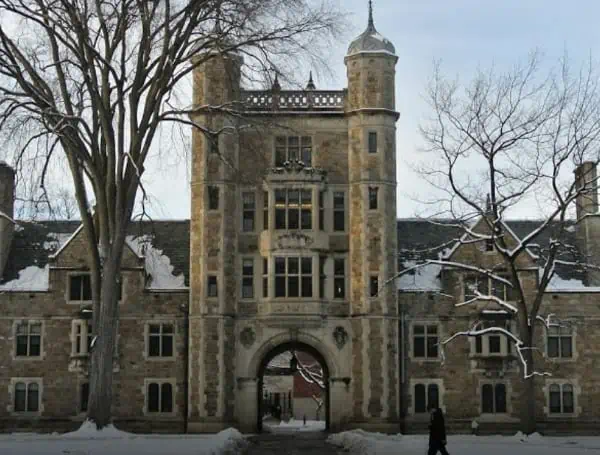A coalition of leading American universities and higher education associations filed a federal lawsuit Monday against the U.S. Department of Energy (DOE) and its Secretary, Chris Wright, challenging a newly announced policy that dramatically slashes funding for the indirect costs of research conducted at universities.
Filed in the U.S. District Court for the District of Massachusetts, the complaint argues that the DOE’s “Rate Cap Policy,” issued late on April 11, 2025, is “flagrantly unlawful” and threatens to cripple vital scientific research across the nation. The policy abruptly abandons the long-standing system of negotiated indirect cost rates, instead imposing a flat 15% rate on all DOE grants awarded to Institutions of Higher Education (IHEs).
READ: CNN Legal Analyst Tells Panelist Deported El Salvador Man Isn’t ‘Coming Back
The plaintiffs include the Association of American Universities (AAU), the American Council on Education (ACE), the Association of Public and Land-grant Universities (APLU), and prominent research institutions such as MIT, Caltech, Cornell, Princeton, University of Michigan, Michigan State University, University of Illinois, Brown University, and the University of Rochester.
For decades, the federal government has reimbursed universities for both the direct and indirect costs associated with federally funded research. Direct costs cover expenses easily attributable to a specific project, like salaries for dedicated researchers or specific equipment. Indirect costs, often referred to as Facilities and Administrative (F&A) costs, cover essential shared resources necessary for research but not tied to a single project. These include maintaining sophisticated laboratory facilities, utilities, IT infrastructure, regulatory compliance, and administrative support.
Under regulations established by the Office of Management and Budget (OMB), universities negotiate specific indirect cost rates, typically with the Department of Health and Human Services (HHS) or the Department of Defense (DoD). These negotiated rates, which vary based on an institution’s unique research infrastructure and costs, have historically been binding on all federal agencies, including the DOE. The complaint states the average rate for universities is over 30%, significantly higher than the new 15% cap.
READ: James Carville Suggests It’s Time For Far-Left Dems To Show Themselves The Door
The DOE’s April 11th “Policy Flash” declared that the department would “no longer use the negotiated indirect cost rate” for universities, instead “setting a standardized 15 percent indirect cost rate.” Crucially, the policy also states the DOE “is undertaking action to terminate all grant awards to IHEs that do not conform with this updated policy.”
The DOE justified the change as necessary to “better balance the financial needs of grant recipients with the Department’s obligation to responsibly manage federal funds,” aiming to “improve efficiency and curtail costs where appropriate.” The policy announcement acknowledged that universities use indirect cost payments to conduct research but characterized them as “not for the Department’s direct research funding.”
The universities argue the DOE’s action violates federal regulations (specifically 2 C.F.R. § 200.414) that mandate agencies accept the negotiated rates except under narrow, pre-defined circumstances and procedures, which they claim the DOE ignored. They contend the policy represents an unauthorized, wholesale abandonment of the established system, not a permissible deviation.
Furthermore, the lawsuit claims the policy violates the Administrative Procedure Act (APA) by being “arbitrary and capricious.” The complaint alleges the DOE:
- Provided only conclusory justifications without rational connection to the facts.
- Ignored the essential nature of indirect costs for conducting cutting-edge research.
- Failed to consider the massive reliance interests universities have in the decades-old negotiated rate system, upon which long-term investments and budgets are based.
- Ignored the devastating consequences predicted by Congress when a similar cap was proposed for NIH grants in 2017.
- Failed to learn from a recent federal court decision that permanently enjoined a nearly identical policy implemented by the National Institutes of Health (NIH) earlier this year, finding it unlawful on similar grounds.
- Did not explain why the policy targets only universities and not other DOE grant recipients.
- Arbitrarily chose the 15% rate, which regulations identify as a “de minimis” rate for institutions without a negotiated rate, not a universal cap.
- Unlawfully threatens to terminate existing grants, applying the policy retroactively in effect.
The complaint warns of “immediate and devastating” effects if the policy stands. Universities state they cannot sustain DOE-funded research programs at the drastically reduced rate, jeopardizing critical projects in areas like advanced nuclear technology, cybersecurity, arms control verification, cancer diagnostics, and electrical grid modernization. They anticipate significant staff reductions, stalled research, and irreparable harm to the careers of young scientists and America’s scientific leadership.
Plaintiffs cite potential annual losses in the millions due to the cap: MIT forecasts $15-16 million, University of Michigan $31.1 million, Michigan State University $32 million, and University of Rochester over $25 million.
READ :Liberty Justice Center Urges Supreme Court To Hear Mississippi Christian Free Speech Case
The universities are asking the court to vacate the Rate Cap Policy, declare it unlawful, and issue preliminary and permanent injunctions preventing the DOE from implementing the policy, modifying negotiated rates improperly, or terminating grants based on non-compliance with the new 15% cap.
Please make a small donation to the Tampa Free Press to help sustain independent journalism. Your contribution enables us to continue delivering high-quality, local, and national news coverage.
Connect with us: Follow the Tampa Free Press on Facebook and Twitter for breaking news and updates.
Sign up: Subscribe to our free newsletter for a curated selection of top stories delivered straight to your inbox.
